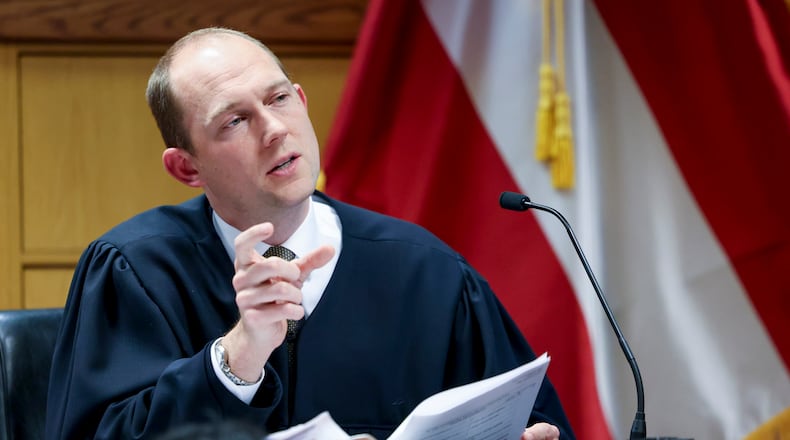Fulton County Superior Court Judge Scott McAfee on Wednesday granted permission for former President Donald Trump and seven others to appeal his recent decision that has kept District Attorney Fani Willis at the helm of the election interference case.
McAfee issued a “certificate of immediate review,” which allows the defendants to appeal his ruling to the Georgia Court of Appeals before a trial begins. It will be up to the appeals court to decide whether to take up the matter.
“The requested motion is granted,” the judge wrote in a short order, which also makes clear he’ll continue to work on other matters related to the case in the meantime.
“The Court intends to continue addressing the many other unrelated pending pretrial motions,” he added, “regardless of whether the petition is granted within 45 days of filing, and even if any subsequent appeal is expedited by the appellate court.”
Eight defendants requested the certificate on Monday, a few days after McAfee mostly denied a motion to disqualify Willis due to her romantic relationship with then-special prosecutor Nathan Wade.
While McAfee ruled that Willis did not have an actual conflict of interest that warranted her removal, he said there was an appearance of a conflict that required her to make a choice. Willis could either recuse herself and her office from the case or cut ties with Wade, McAfee said. Within hours, Wade had tendered his resignation.
The defendants, however, said Wade’s resignation was “insufficient to cure the appearance of impropriety the Court has determined exists.” In particular, they said there was a “lack of guidance from the appellate courts on key issues,” especially in relation to whether Willis’ comments during a recent church speech were considered a disqualifying form of forensic misconduct.
“Whether District Attorney Willis and her office are permitted to continue representing the State of Georgia in prosecuting the Defendants in this action is of the utmost importance to this case, and ensuring the appellate courts have the opportunity to weigh in on these matters pre-trial is paramount,” wrote the group of defendants, led by Trump.
The defense now has 10 days to file its application to the Court of Appeals. Then the appeals court has 45 days to decide whether it will hear the matter.
Steve Sadow, Trump’s lead Atlanta attorney, called McAfee’s granting of the certificate “highly significant.”
“The defense is optimistic that appellate review will lead to the case being dismissed and the DA being disqualified,” he said.
Willis spokesman Jeff DiSantis said the DA’s office will seek to move the case to trial “as quickly as possible” given that work is not being halted during the appeal.
“We will limit our comment on the appellate matter to what we file with the Court of Appeals during the briefing process,” he said.
More uncertainty about timing
The upcoming appeal, however, adds to the uncertainty about when the Georgia election case will go to trial.
Prosecutors have asked that all the defendants be tried this August. But numerous factors make such a timeline highly unlikely.
For starters, McAfee has expressed skepticism that all the defendants can be tried at once. That likely would mean multiple trials, along with difficult decisions for the prosecution about which of the remaining 15 defendants should be tried together.
The court must also resolve other issues before the case can go to trial. One example: Trump claims he is immune from prosecution for any actions he took while president. He has asserted that claim in the Georgia case as well as the federal election interference case.
Federal courts have twice rejected Trump’s claim of total immunity. But the U.S. Supreme Court has scheduled arguments on the issue for the week of April 22.
The high court is expected to issue a ruling on the immunity issue before its current term ends in June. In a recent email to defense attorneys, Fulton prosecutors said they planned to respond to Trump’s immunity claim within two weeks of the Supreme Court’s decision. That means it could be late June or even July before the DA’s office responds.
Finally, the schedule for the Georgia case could be affected by the three other criminal cases against Trump. For example, if the Supreme Court rejects Trump’s immunity claim, the federal election case is expected to proceed to trial before the Georgia case.
Critics contend Trump has used delay tactics to postpone his various criminal trials until after the November election. If he is elected president, that could allow him to use his authority to squelch the federal cases altogether. Whether state cases such as Willis’ can continue remains an untested question.
Norm Eisen, White House ethics czar for former President Barack Obama, and Richard Painter, an ethics lawyer for former President George W. Bush, see the recent Willis allegations in a similar light.
“It was clear that the defendants’ motion to disqualify DA Willis was nothing but a tactic to distract from their alleged crimes and delay justice,” Eisen and Painter said in a statement this week.
Other lawyers have said the defendants raised legitimate concerns about Willis’ conflicting interests in the case and the ethical responsibilities of prosecutors given their power. In his ruling, McAfee himself criticized Willis’ “tremendous lapse in judgment” in pursuing a relationship with Wade and found “a significant appearance of impropriety that infects the current structure of the prosecution team.”
Keep Reading
The Latest
Featured






